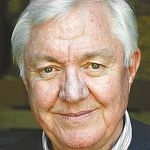 (HOST) What’s in a name? Today commentator Barrie Dunsmore, veteran diplomatic and foreign correspondent for ABC News, tells us about a name change he thinks is significant and long overdue.
(HOST) What’s in a name? Today commentator Barrie Dunsmore, veteran diplomatic and foreign correspondent for ABC News, tells us about a name change he thinks is significant and long overdue.
(DUNSMORE) Nine days after the 9/11 attacks, President George W. Bush addressed the Congress. One phrase in his speech set the tone and defined a strategy for the next seven years of his Presidency. "Our war on terror," said the President, "will not end until every terrorist group of global reach has been found, stopped and defeated."
Thus was born the Global War on Terror. As critics – including this one – noted, terrorism is neither an ideology nor something exclusive to one country or group. It is a tactic used to achieve political goals through killing and intimidating civilians. It is reprehensible, but there are few countries that at some point in their histories haven’t resorted to such tactics. For this country, think President Andrew Jackson and his ethnic cleansing of American Indians.
But the main problem with the term Global War on Terror isn’t just a matter of semantics. Simply stated, the way Mr. Bush defined it, this could be a war without end. Moreover, it opened the door to counter-tactics that were arguably as egregious as terrorism. Only last month the International Commission of Jurists, a widely respected human rights group, called on the Obama administration to drop the term – war on terror. The commission said the Bush administration has used it as justification for a range of human rights violations, including detention and interrogation methods that the International Red Cross has described as torture.
I’m not sure if President Obama got that memo, but the Washington Post reported earlier this week that his administration appears to be backing away from the phrase. The Post cited an executive branch e-mail to the Pentagon which states, "This administration prefers to avoid using the term ‘Long War’ or ‘Global War on Terror.’ Please use Overseas Contingency Operation."
There has since been some bureaucratic to-ing and fro-ing over whether this represents an official change in policy. But the Post found that, in Congressional testimony in recent days, two top Pentagon officials used the phrase – overseas contingency operations – where they might earlier have used Global War on Terror.
And Peter Orzag, the director of the Office of Management and Budget, said, when discussing Obama’s budget proposals, "The budget shows the combined costs of operations in Iraq, Afghanistan and any other overseas contingency operations that may be necessary."
Admittedly, the term – Overseas Contingency Operations – isn’t likely to stir one’s soul to fight for flag and country. But that is exactly the point. This is a national security problem that needs to be put into proper perspective. That doesn’t mean that America will stop doing battle with groups like al-Qaeda. Those fights are on-going. But by grouping all insurgencies all over the world, the United States has both glorified its enemies and magnified their actual strength. I would guess that Osama Bin Laden will not be happy to hear that he has been demoted from prime American adversary in the Global War on Terror to merely the target of an overseas contingency operation.